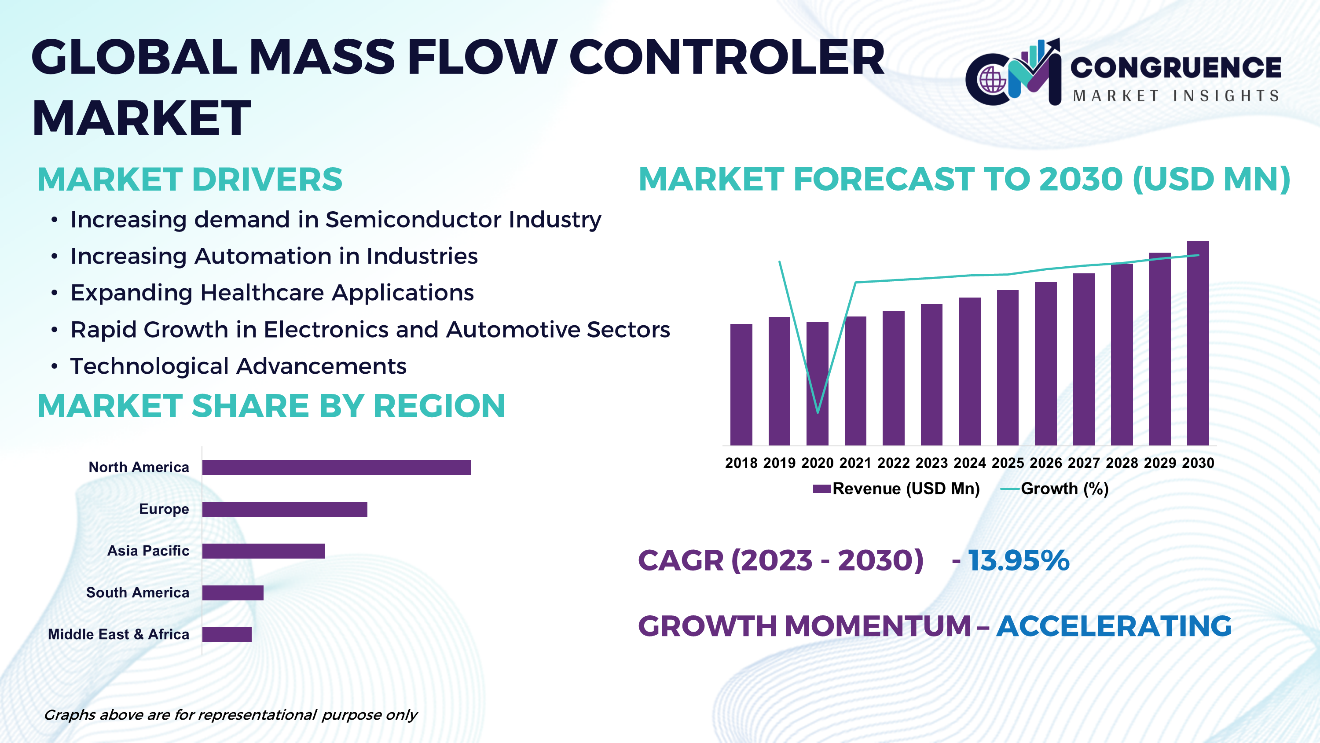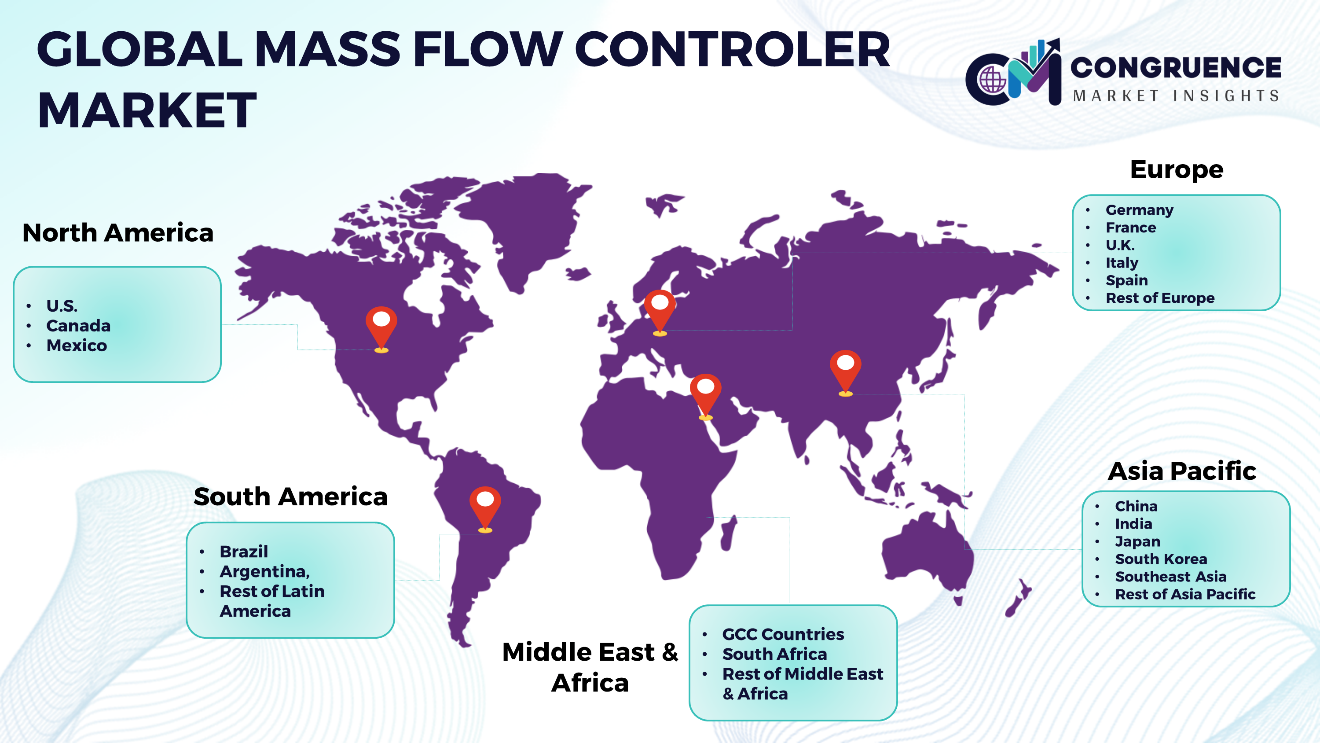Reports
The Global Mass Flow Controller Market is expected to expand at a CAGR of 13.95% between 2023 and 2030. Mass Flow Controllers (MFCs) play a pivotal role in regulating the precise flow of gases across various industries, ensuring accuracy in processes such as semiconductor manufacturing, healthcare, and environmental monitoring. In recent years, the sector has witnessed notable technology upgradation and innovations. Advanced MFCs now integrate cutting-edge features, including digital communication protocols, closed-loop control systems, and sophisticated materials for enhanced performance. The incorporation of Coriolis and thermal dispersion technologies has further refined flow measurement accuracy. Additionally, the market has seen innovations in smart sensors and connectivity, enabling seamless integration with industrial automation systems. This evolving landscape reflects a growing demand for improved efficiency, reduced environmental impact, and increased automation across diverse applications, underscoring the critical role of MFCs in modern industrial processes.

Mass Flow Controller Market Major Driving Forces
Increasing Automation in Industries: Automation in manufacturing processes, particularly in industries such as pharmaceuticals, chemicals, and petrochemicals, fuels the demand for MFCs to ensure accurate and automated control of gas flows.
Increasing demand in Semiconductor Industry: The semiconductor industry heavily relies on MFCs for precise control of gas flows in manufacturing processes. As semiconductor technologies advance, the demand for high-precision MFCs continues to grow.
Expanding Healthcare Applications: In medical and biotechnological applications, MFCs are essential for controlling gas flows in processes such as anesthesia delivery, laboratory experiments, and medical equipment.
Rapid Growth in Electronics and Automotive Sectors: The electronics and automotive industries, with their growing demand for advanced technologies and manufacturing processes, drive the adoption of MFCs for applications such as coating, heat treatment, and quality control.
Technological Advancements: Ongoing technological innovations, such as the integration of digital communication protocols, smart sensors, and advanced materials, contribute to the enhanced performance and versatility of MFCs, driving their adoption.
Mass Flow Controller Market Key Opportunities
Integration with Industry 4.0: The amalgamation of MFCs with Industry 4.0 and the Industrial Internet of Things (IIoT) creates prospects for heightened connectivity, real-time monitoring, and data analytics. Smart MFCs have the potential to contribute to intelligent, data-driven decision-making within manufacturing processes.
Advancements in Materials Science: Continuous progress in materials science presents opportunities to craft MFCs with enhanced durability, corrosion resistance, and overall performance. Innovations in materials can result in MFCs better suited for challenging environments and specialized applications.
Growing Demand in Emerging Sectors: The expansion of industries such as electric vehicles, renewable energy, and biotechnology is generating an increasing requirement for precise gas flow control. This trend opens up new possibilities for Mass Flow Controllers (MFCs) to discover novel applications in these sectors, creating avenues for industry participants.
Mass Flow Controller Market Key Trends
· MFCs are increasingly integrated into Industry 4.0 frameworks, leveraging smart sensors and connectivity to enable real-time data monitoring and analysis.
· Digital MFCs, equipped with advanced communication protocols such as Modbus or Profibus, are gaining popularity.
· Micro-Electro-Mechanical Systems (MEMS) technology is increasingly used in the manufacturing of MFCs. MEMS-based controllers offer advantages such as reduced size, improved accuracy, and cost-effectiveness.
· Ongoing innovations in flow measurement technologies, such as Coriolis-based sensors and thermal dispersion, contribute to improved accuracy and reliability of MFCs in various applications.
· The adoption of wireless communication protocols, like Bluetooth and Wi-Fi, is increasing in MFCs. Wireless connectivity facilitates easier installation, maintenance, and integration into IoT-enabled systems.

Market Competition Landscape
The Mass Flow Controller (MFC) market experiences vigorous competition among industry leaders, underscored by a focus on technological innovation, seamless integration with Industry 4.0, and the provision of customized solutions for specific applications. The sector's expansion is additionally influenced by emerging players, demonstrating advancements in materials science and introducing compact, wireless MFC solutions. This competitive landscape is defined by a collective pursuit of increased accuracy, miniaturization, and sustainable practices within the dynamic context of industrial evolution.
Key players in the global Mass Flow Controller market implement various organic and inorganic strategies to strengthen and improve their market positioning. Prominent players in the market include:
· Brooks Instrument
· SensoTech
· Fluigent
· E+E Elektronik Ges.m.b.H.
· Elvesys
· Sierra Instruments (TASI Group)
· MKS Instruments
· Bronkhorst
· Alicat Scientific
· HORIBA
· Teledyne Hastings Instruments
· Swagelok Company
· Sensirion AG
· TOKYO KEISO CO.,LTD.
· OMEGA Engineering inc.
· Honeywell International Inc.
· Christian Bürkert GmbH & Co. KG
· PARKER HANNIFIN CORP
|
Report Attribute/Metric |
Details |
|
Base Year |
2022 |
|
Forecast Period |
2023 – 2030 |
|
Historical Data |
2018 to 2022 |
|
Forecast Unit |
Value (US$ Mn) |
|
Key Report Deliverable |
Revenue Forecast, Growth Trends, Market Dynamics, Segmental Overview, Regional and Country-wise Analysis, Competition Landscape |
|
Segments Covered |
· By Flow Rate Type (Low Flow Rate, and High Flow Rate) · By Technology (Differential Pressure-based, and Thermal-based) · By Application (Pharmaceutical and Biotechnology, Semiconductor Manufacturing, Oil and Gas, and Others) · By End-Use Industry (Electronics and Electrical, Medical and Healthcare, Chemical and Petrochemical, and Others) |
|
Geographies Covered |
North America: U.S., Canada and Mexico Europe: Germany, France, U.K., Italy, Spain, and Rest of Europe Asia Pacific: China, India, Japan, South Korea, Southeast Asia, and Rest of Asia Pacific South America: Brazil, Argentina, and Rest of Latin America Middle East & Africa: GCC Countries, South Africa, and Rest of Middle East & Africa |
|
Key Players Analyzed |
Brooks Instrument, SensoTech, Fluigent, E+E Elektronik Ges.m.b.H., Elvesys, Sierra Instruments (TASI Group), MKS Instruments, Bronkhorst, Alicat Scientific, HORIBA, Teledyne Hastings Instruments, Swagelok Company, Sensirion AG, TOKYO KEISO CO.,LTD., OMEGA Engineering inc., Honeywell International Inc., Christian Bürkert GmbH & Co. KG, PARKER HANNIFIN CORP |
|
Customization & Pricing |
Available on Request (10% Customization is Free) |
